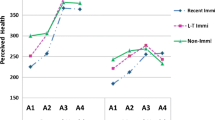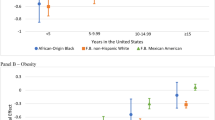Abstract
OBJECTIVE: New immigrants generally arrive in Canada with a health advantage over their Canadian counterparts, but lose that advantage over time. Difficulties in acquiring a physician may contribute. Past studies relied on older data, and lacked control for many confounders and assessment of gender differences. We assessed the relationship between immigrant status and having a regular doctor among Canadian adults.
METHODS: Cross-sectional data from the 2011–2012 Canadian Community Health Survey were self-reported by 73,958 respondents aged 18–64, representing >20 million Canadian adults. The relationship between immigrant status and having a doctor was analyzed using χ2 and logistic regression analyses stratified by gender. Age, body mass index, race, education, province of residence, physical activity, chronic conditions, self-perceived health, and number of children in household were controlled.
RESULTS: Approximately 77% of males and 87% of females reported having a doctor. About 7% of respondents reported being new immigrants in Canada (0–9 years), while 16% were established immigrants (≥10 years). For males (M) and females (F) respectively, 78% and 88% of non-immigrants, 55% and 68% of new immigrants, and 84% and 91% of established immigrants reported having a doctor (p < 0.001). Compared to non-immigrants, new immigrants were significantly less likely to have a doctor (OR (95% CI) M: 0.43 (0.38–0.47); F: 0.36 (0.32–0.41)), while established immigrants were significantly more likely to have a doctor (M: 1.13 (1.03–1.24); F: 1.16 (1.03–1.30)).
CONCLUSION: New Canadian immigrants are less likely to have a regular doctor compared to non-immigrants, and should be targeted by policies and programs facilitating finding a doctor.
Résumé
OBJECTIF: Les nouveaux immigrants arrivent en général au Canada en meilleure santé que leurs homologues canadiens, mais ils perdent cet avantage au fil du temps. La difficulté de trouver un médecin peut y être pour quelque chose. Les études antérieures s’appuyaient sur des données plus anciennes et ne tenaient pas compte de nombreux facteurs confusionnels ni des différences entre les sexes. Nous avons évalué la relation entre le statut d’immigrant et le fait d’avoir un médecin attitré chez les adultes canadiens.
MÉTHODE: Les données transversales de l’Enquête sur la santé dans les collectivités canadiennes de 2011–2012 ont été autodéclarées par 73 958 répondants de 18 à 64 ans, qui représentaient >20 millions d’adultes canadiens. Nous avons analysé la relation entre le statut d’immigrant et le fait d’avoir un médecin à l’aide du χ2 et d’analyses de régression logistique stratifiées selon le sexe. Nous avons également tenu compte de l’âge, de l’indice de masse corporelle, de la race, du niveau d’instruction, de la province de résidence, de l’activité physique, des états chroniques, de la santé autoperçue et du nombre d’enfants du ménage.
RÉSULTATS: Environ 77 % des hommes et 87 % des femmes ont déclaré avoir un médecin. Environ 7 % des répondants ont déclaré être de nouveaux immigrants au Canada (9 ans ou moins), tandis que 16 % étaient des immigrants établis (≥10 ans). Pour les hommes et les femmes respectivement, 78 % et 88 % des non-immigrants, 55 % et 68 % des nouveaux immigrants, et 84 % et 91 % des immigrants établis ont déclaré avoir un médecin (p < 0,001). Comparativement aux non-immigrants, les nouveau immigrants étaient significativement moins susceptibles d’avoir un médecin (RC (IC de 95 %) hommes: 0,43 (0,38–0,47); femmes: 0,36 (0,32–0,41)), tandis que les immigrants établis étaient de manière significative plus susceptibles d’avoir un médecin (hommes: 1,13 (1,03–1,24); femmes: 1,16 (1,03–1,30)).
CONCLUSION: Les nouveaux immigrants canadiens sont moins susceptibles d’avoir un médecin attitré que les non-immigrants et devraient être ciblés par les politiques et les programmes qui facilitent la recherche d’un médecin.
Similar content being viewed by others
References
Statistics Canada. Population Growth in Canada: From 1851 to 2061. 2011 Census. Catalogue no. 98-310-X2011003. Ottawa, ON: Statistics Canada, 2011.
Statistics Canada. Immigration and Ethnocultural Diversity in Canada. National Household Survey. Catalogue no. 99-010-X2011001. Ottawa, ON: Statistics Canada, 2011.
Dastjerdi M, Olson K, Ogilvie L. A study of Iranian immigrants’ experiences of accessing Canadian health care services: A grounded theory. Int J Equity Health 2012;11: 55. PMID: 23021015. doi: 10.1186/1475-9276-11-55.
Gushulak BD, Pottie K, Hatcher Roberts J, Torres S, DesMeules M. Migration and health in Canada: Health in the global village. CMAJ 2011;183(12): E952–58. PMID: 20584934. doi: 10.1503/cmaj.090287.
Ng E, Pottie K, Spitzer D. Official language proficiency and self-reported health among immigrants to Canada. Health Rep 2011;22(4):15–23. PMID: 22352148.
Gee EM, Kobayashi KM, Prus, SG. Examining the healthy immigrant effect in mid- to later life: Findings from the Canadian Community Health Survey. Can J Aging 2004;23(Suppl 1):S61–69. PMID: 15660311. doi: 10.1353/cja.2005.0032.
Subedi RP, Rosenberg, MW. Determinants of the variations in self-reported health status among recent and more established immigrants in Canada. Soc Sci Med 2014;115:103–10. PMID: 24953500. doi: 10.1016/j.socscimed.2014. 06.021.
Ng E, LHAD Research Team. Insights into the Healthy Immigrant Effect: Mortality by Period of Immigration and Birthplace. Ottawa, ON: Statistics Canada, 2011.
Newbold KB, Danforth J. Health status and Canada’s immigrant population. Soc Sci Med 2003;57(10):1981–95. PMID: 14499520. doi: 10.1016/S0277-9536(03)00064-9.
Statistics Canada. Population with a Regular Medical Doctor, by Age Group and Sex. CANSIM Table 105-0501. Catalogue no. 82-221-X. Ottawa, ON: Statistics Canada, 2014.
Statistics Canada. Access to a Regular Medical Doctor, 2013. Catalogue no. 82-625-X. Ottawa, ON: Statistics Canada, 2014.
Freeman T, Brown JB, Reid G, Stewart M, Thind A, Vingilis E. Patients’ perceptions on losing access to FPs: Qualitative study. Can Fam Physician 2013;59(4):e195–201. PMID: 23585623.
Lasser KE, Himmelstein DU, Woolhandler S. Access to care, health status, and health disparities in the United States and Canada: Results of a cross-national population-based survey. Am J Public Health 2006;96(7):1300–07. PMID: 16735628. doi: 10.2105/AJPH.2004.059402.
Lebrun LA, Dubay, LC. Access to primary and preventive care among foreign-born adults in Canada and the United States. Health Serv Res 2010; 45:1693–719. PMID: 20819107. doi: 10.1111/j.1475-6773.2010.01163.x.
Setia MS, Quesnel-Vallee A, Abrahamowicz M, Tousignant P, Lynch J. Access to health-care in Canadian immigrants: A longitudinal study of the National Population Health Survey. Health Soc Care Community 2011;19(1):70–79. PMID: 21054621. doi: 10.1111/j.1365-2524.2010.00950.x.
McDonald JT, Kennedy S. Insights into the ‘healthy immigrant effect’: Health status and health service use of immigrants to Canada. Soc Sci Med 2004; 59(8):1613–27. PMID: 15279920. doi: 10.1016/j.socscimed.2004.02.004.
Derose KP, Bahney BW, Lurie N, Escarce, JJ. Review: Immigrants and health care access, quality, and cost. Med Care Res Rev 2009;66(4):355–408. PMID: 19179539. doi: 10.1177/1077558708330425.
Ku L, Matani S. Left out: Immigrants’ access to health care and insurance. Health Aff (Millwood) 2001;20(1):247–56. PMID: 11194848. doi: 10.1377/hlthaff.20.1.247.
Asanin J, Wilson K. “I spent nine years looking for a doctor”: Exploring access to health care among immigrants in Mississauga, Ontario, Canada. Soc Sci Med 2008;66(6):1271–83. PMID: 18194831. doi: 10.1016/j.socscimed.2007.11.043.
Dastjerdi M. The case of Iranian immigrants in the greater Toronto area: A qualitative study. Int J Equity Health 2012;11:9. PMID: 22369146. doi: 10.1186/1475-9276-11-9.
Socias ME, Koehoorn M, Shoveller J. Gender inequalities in access to health care among adults living in British Columbia, Canada. Women’s Health Issues 2016;26(1):74–79. PMID: 26384547. doi: 10.1016/j.whi.2015.08.001.
Shahidi, FV. Community-Based Perspectives on the Political Economy of Immigrant Health: A Qualitative Study. Toronto, ON: Wellesley Institute, 2011. Available at: http://www.wellesleyinstitute.com/wp-content/uploads/2012/05/Political-Economy-of-Immigrant-Health.pdf (Accessed April 20, 2015).
Statistics Canada. Canadian Community Health Survey (CCHS): User Guide 2012 and 2011–2012 Microdata Files. Ottawa, ON: Statistics Canada, 2013.
Andersen R, Newman, JF. Societal and individual determinants of medical care utilization in the United States. Milbank Q 2005;83(4):515–21. doi: 10.1111/j.1468-0009.2005.00428.x.
Health Canada. Canadian Guidelines for Body Weight Classification in Adults. Ottawa, ON: Health Canada, 2003.
Taylor HL, Jacobs DR Jr, Schucker B, Knudsen J, Leon AS, Debacker G. A questionnaire for the assessment of leisure time physical activities. J Chronic Dis 1978;31(12):741–55. PMID: 748370. doi: 10.1016/0021-9681 (78)90058-9.
Ministry of Health and Long-Term Care. Initial Report on Public Health. Public Health Division. Ottawa, ON: Ministry of Health and Long-Term Care, 2009. Available at: http://www.health.gov.on.ca/en/public/publications/ pubhealth/init_report/pdfs/initial_rep_on_public_health_rep_20090821.pdf (Accessed June 25, 2015).
Lebrun, LA. Effects of length of stay and language proficiency on health care experiences among immigrants in Canada and the United States. Soc Sci Med 2012;74(7):1062–72. PMID: 22326103. doi: 10.1016/j.socscimed.2011.11.031.
Muggah E, Dahrouge S, Hogg W. Access to primary health care for immigrants: Results of a patient survey conducted in 137 primary care practices in Ontario, Canada. BMC Fam Pract 2012;13:128. PMID: 23272805. doi: 10.1186/1471-2296-13-128.
Bertakis KD, Azari R, Helms LJ, Callahan EJ, Robbins, JA. Gender differences in the utilization of health care services. J Fam Pract 2000;49(2):147–52. PMID: 10718692.
Brett KM, Burt, CW. Utilization of ambulatory medical care by women: United States, 1997–98. Vital Health Stat 13 2001;149:1–46. PMID: 11478128.
Turcotte M. Women in Canada: A Gender-Based Statistical Report. Ottawa, ON: Statistics Canada, 2011.
Edge S, Newbold B. Discrimination and the health of immigrants and refugees: Exploring Canada’s evidence base and directions for future research in newcomer receiving countries. J Immigr Minor Health 2013;15(1):141–48. PMID: 22729289. doi: 10.1007/s10903-012-9640-4.
Author information
Authors and Affiliations
Corresponding author
Additional information
Acknowledgements: MLD was supported by a Canadian Institutes of Health Research Frederick Banting and Charles Best Canada Graduate Scholarship.
Conflict of Interest: None to declare.
Rights and permissions
About this article
Cite this article
Degelman, M.L., Herman, K.M. Immigrant status and having a regular medical doctor among Canadian adults. Can J Public Health 107, e75–e80 (2016). https://doi.org/10.17269/cjph.107.5205
Received:
Accepted:
Published:
Issue Date:
DOI: https://doi.org/10.17269/cjph.107.5205




